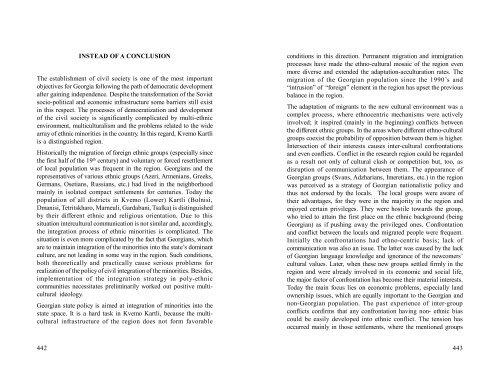socialuri usafrTxoebis eTnikuri aspeqtebi polieTnikur sazogadoebaSi
socialuri usafrTxoebis eTnikuri aspeqtebi polieTnikur sazogadoebaSi
socialuri usafrTxoebis eTnikuri aspeqtebi polieTnikur sazogadoebaSi
You also want an ePaper? Increase the reach of your titles
YUMPU automatically turns print PDFs into web optimized ePapers that Google loves.
INSTEAD OF A CONCLUSIONThe establishment of civil society is one of the most importantobjectives for Georgia following the path of democratic developmentafter gaining independence. Despite the transformation of the Sovietsocio-political and economic infrastructure some barriers still existin this respect. The processes of democratization and developmentof the civil society is significantly complicated by multi-ethnicenvironment, multiculturalism and the problems related to the widearray of ethnic minorities in the country. In this regard, Kvemo Kartliis a distinguished region.Historically the migration of foreign ethnic groups (especially sincethe first half of the 19 th century) and voluntary or forced resettlementof local population was frequent in the region. Georgians and therepresentatives of various ethnic groups (Azeri, Armenians, Greeks,Germans, Osetians, Russians, etc.) had lived in the neighborhoodmainly in isolated compact settlements for centuries. Today thepopulation of all districts in Kvemo (Lower) Kartli (Bolnisi,Dmanisi, Tetritskharo, Marneuli, Gardabani, Tsalka) is distinguishedby their different ethnic and religious orientation. Due to thissituation intercultural communication is not similar and, accordingly,the integration process of ethnic minorities is complicated. Thesituation is even more complicated by the fact that Georgians, whichare to maintain integration of the minorities into the state’s dominantculture, are not leading in some way in the region. Such conditions,both theoretically and practically cause serious problems forrealization of the policy of civil integration of the minorities. Besides,implementation of the integration strategy in poly-ethniccommunities necessitates preliminarily worked out positive multiculturalideology.Georgian state policy is aimed at integration of minorities into thestate space. It is a hard task in Kvemo Kartli, because the multiculturalinfrastructure of the region does not form favorableconditions in this direction. Permanent migration and immigrationprocesses have made the ethno-cultural mosaic of the region evenmore diverse and extended the adaptation-acculturation rates. Themigration of the Georgian population since the 1990’s and“intrusion” of “foreign” element in the region has upset the previousbalance in the region.The adaptation of migrants to the new cultural environment was acomplex process, where ethnocentric mechanisms were activelyinvolved; it inspired (mainly in the beginning) conflicts betweenthe different ethnic groups. In the areas where different ethno-culturalgroups coexist the probability of opposition between them is higher.Intersection of their interests causes inter-cultural confrontationsand even conflicts. Conflict in the research region could be regardedas a result not only of cultural clash or competition but, too, asdisruption of communication between them. The appearance ofGeorgian groups (Svans, Adzharians, Imeretians, etc.) in the regionwas perceived as a strategy of Georgian nationalistic policy andthus not endorsed by the locals. The local groups were aware oftheir advantages, for they were in the majority in the region andenjoyed certain privileges. They were hostile towards the group,who tried to attain the first place on the ethnic background (beingGeorgian) as if pushing away the privileged ones. Confrontationand conflict between the locals and migrated people were frequent.Initially the confrontations had ethno-centric basis; lack ofcommunication was also an issue. The latter was caused by the lackof Georgian language knowledge and ignorance of the newcomers’cultural values. Later, when these new groups settled firmly in theregion and were already involved in its economic and social life,the major factor of confrontation has become their material interests.Today the main focus lies on economic problems, especially landownership issues, which are equally important to the Georgian andnon-Georgian population. The past experience of inter-groupconflicts confirms that any confrontation having non- ethnic biascould be easily developed into ethnic conflict. The tension hasoccurred mainly in those settlements, where the mentioned groups442 443


